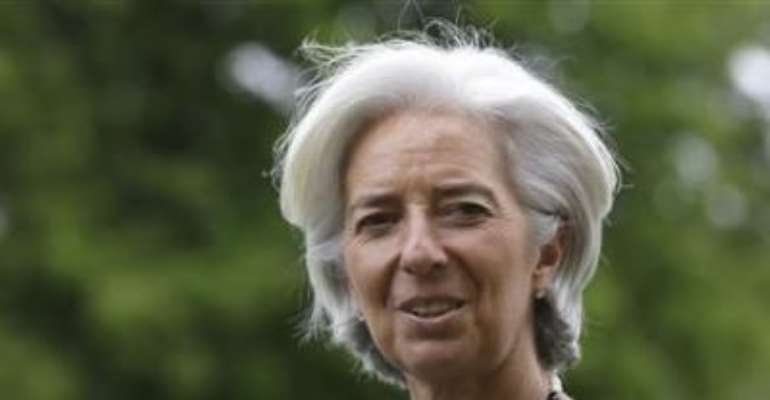Heading To G7, U.S. Tells Japan To Stick To Currency Rules

The United States told Japan on Friday to stick to the rules when it came to the value of its currency, setting the stage for a potentially frank meeting of Group of Seven finance ministers outside London.
Treasury Secretary Jack Lew said Japan had "growth issues" that needed to be dealt with but that its attempts to stimulate its economy needed to stay within the bounds of international agreements to avoid competitive devaluations.
"I'm just going to refer back to the ground rules and the fact that we've made clear that we'll keep an eye on that," Lew told the CNBC news channel.
The yen hit a four-year low against the dollar earlier on Friday, beyond the psychologically important 100 yen mark. It also trades at a three-year low against the euro.
The moves were driven in part by Japanese investors shifting into foreign bonds, a move that has been expected since the Bank of Japan unveiled a massive stimulus plan.
Tokyo insisted its tumbling yen would not be a hot topic at the meeting of finance chiefs, despite revived rhetoric about a currency war.
"The Bank of Japan isn't targeting currency rates, which are determined by the markets," the bank's governor, Haruhiko Kuroda, said.
Policymakers are concerned that Japan is engineering an export-led recovery that could hinder other regions' ability to grow.
But having urged Tokyo for years to do something to revive its economy, other world powers are not in a strong position to complain now that it is. Then there is the fact that central banks such as the Federal Reserve and Bank of England have printed money in the way the Bank of Japan is.
"It is important that in line with the previous decisions at the G20 and IMF that there is no talk about currency wars," EU economics chief Olli Rehn told reporters as he arrived at the summit. "There is discussion about how better to coordinate our economic policies."
German Finance Minister Wolfgang Schaeuble said foreign exchange rates would be on the agenda and that Japan had promised to take a cautious approach to the currency issue.
Participants welcomed the return to an informal G7 with no official communiqué. That could mean more robust debate than is generally aired at meetings of the United States, Germany, Japan, Britain, Italy, France and Canada, or at the broader G20 group.
"There are no taboo subjects as we are in an informal setting," International Monetary Fund chief Christine Lagarde Lagarde said.
GROWTH DEBATE
UK finance minister George Osborne, host of the two-day meeting in a stately home set in rolling countryside 40 miles outside London, is keen for his peers to focus on what more central banks can do to help growth at a time when most governments are trying to cut spending and bloated debts.
"(This is) an opportunity to consider what more monetary activism can do to support the recovery, while ensuring medium-term inflation expectations remain anchored," he said.
Osborne has tasked the next UK central bank governor, Mark Carney, with finding new ways to boost growth when he succeeds Mervyn King in July.
Debate is also heating up about the need to ease up on austerity, something that Germany, Britain and Canada view as a mistake but Washington, Paris and Rome are in favor of.
"For a global recovery ... it cannot be led by the United States alone ... There are countries in Europe that have more fiscal space to create a bit more economic demand," Lew said.
Rehn said there was room for a "smoother path of fiscal adjustment" in Europe as long as structural reforms intensified.
Britain's finance ministry said the talks over Friday and Saturday at the 17th-century country house were also likely to focus on bank regulation, tax avoidance and free trade.
The emergency rescue of Cyprus in March acted as a reminder of the need to finish an overhaul of the banking sector, five years after the world financial crisis began.
As at last month's IMF meeting, Germany may come under pressure to give more support to a banking union in the euro zone. The plan could help strengthen the single currency area, but Berlin worries it may pay too much for future bank bailouts.
"Banking union is an important project that should be based on two pillars: one, common supervision, and two a resolution mechanism. We shall discuss both," German central bank chief Jens Weidmann said.
While the first step - to create a single bank supervisor under the ECB - looks set to be in place by mid-2014, a second pillar, a 'resolution' fund to close failed banks, is in doubt. And there is little prospect that a single deposit guarantee scheme, will ever see the light of day.
Osborne will nonetheless push his fellow G7 ministers to set up mechanisms to shut down failing banks, which would otherwise be considered "too big to fail".
Some of the officials said they did not know why Britain had called the meeting so soon after the IMF discussions in Washington. But Osborne said there was value in talks that were more informal than larger meetings of the world's major economies which form the Group of 20.
No formal decisions are expected at the meeting, which will help prepare the way for a G20 leaders' summit in Russia in September.
REUTERS
